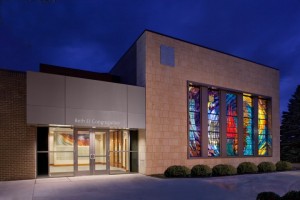A pandemic that has wrecked untold suffering and rapid, unprecedented loss of life, broken political systems, suspicion of the other, social isolation, and despair: that summarizes the mood of many since March. We’ve had to shut ourselves in and shut our loved ones out for fear of infection. A Zoom seder was a novelty, but the thought of Rosh ha-Shanah online makes us nostalgic for lengthy tefilot. Even if we’re able to daven at socially safe services, the sight of a Shofar covered with a KN95 mask will be unsettling. How can we maintain our faith until researchers develop a safe, effective vaccine? Here are four practices rooted in Rabbinic texts that I’ve adopted in preparation for the yamim noraim and the days that follow:
Act: Speak Little and Do Much/ אֱמֹר מְעַט וַעֲשֵׂה הַרְבֵּה (Pirkei Avot 1:15)
Very few statues have been dedicated to critics; it’s the creators, those who act and lead the way to change, who are honored. The warning, “If you see something, say something applies to public safety situations. But we’ve generalized this advice and often reflexively post our annoyance with a person or issue without thought to the aftermath. To build immunity against making gratuitous comments, I will criticize a bothersome situation only when I can work to remedy it, alone or working with others.
Engage: Don’t Separate Yourself from the Community/ הִלֵּל אוֹמֵר, אַל תִּפְרֹשׁ מִן הַצִּבּוּר
(Pirkei Avot 2:4)
I’ve used creative license to incorporate this value into my life as it’s a challenge for someone with autoimmune or certain other medical conditions, and those whose age puts them at greater risks for COVID-19 complications. My social bubble is small, but I’m engaging with the community as a Biden-Harris “call-crew” volunteer. Last year, I thought that I would be knocking on doors in my neighboring swing state, Wisconsin. Instead, the campaign’s sophisticated system is my key to voters’ homes. I’m one of a motivated multitude of callers who don’t want to be bystanders to the 2020 election results. This campaign’s outcome will be consequential for America, the American Jewish community, and the State of Israel. By engaging in some political action, I feel like I’m inoculating myself against political apathy.
Trust: Judge all people favorably/ דָן אֶת כָּל הָאָדָם לְכַף זְכוּת (Pirkei Avot 1:6)
The ancient sages who spoke these words must have been peering 2,000 years into our contemporary culture. Does it feel like people increasingly give others the “detriment of the doubt” and don’t extend the “benefit of the doubt” to them? You might believe so if you remember when disagreements were fruitful and when leaders viewed a compromise as noble. You can’t compromise with people who are anti-Semitic and racist or support hostile views on gender and sexual orientation. We should challenge statements that diminish the innate Divine worth of another person. But learning how to have a respectful disagreement on a significant issue is a skill that we need to reacquire. Divergent viewpoints help clarify our thinking. We may learn that “the other side” has some ideas that are not so crazy, and the other side may realize that we’re also not insane. We may find areas of agreement that are the basis for joint action. To build my immunity against being narrow-minded, I’m doubling down on my commitment to trust that I can learn more about others whose ideas differ from mine, provided that they do not disrespect the godliness that everyone shares equally.
Hope: Did you hope intensely for salvation/ צָפִיתָ לִישׁוּעָה (BT Shabbat 31a) (Heschel’s translation)
Hoping for a better world does not mean waiting for it to emerge. Abraham Joshua Heschel wrote, “To wait is to stay in readiness, to live a life of expectation” (Israel: An Echo of Eternity, p.96). A continuous strand that runs through Jewish history in tragic and joyful times is living life in a state of active, anticipatory hope. In practice, that means attempting to maintain spiritual and religious practices even when our hearts make carrying those routines heavy. It can also mean performing work or volunteering for causes that won’t bear fruit until decades from now and investing more in what is most important: relationships with family, friends, and community. In 5781, I’m committing to finishing a first draft of a book with my friend and colleague, Rabbi Jeffrey Schein, tentatively titled, L’Dor va-Dor in a Digital Age: Reimagining a Jewish Intergenerational Community.
Life has taught me the meaning of faith or emunah: with God’s help and the help of family and friends, we get through the worst difficulties, even when a crisis envelopes us in a thick fog confusion. Emunah doesn’t shield us from pain, but it makes it more bearable. I’ve also learned not to judge people for what they can and cannot bear. No one voluntarily chooses to live with anxiety, depression, hopelessness, and fear as constants in their lives. We’re doing the best we can in what often feels like a Hollywood apocalyptic movie, but this is life now. I hope that you’ll share your ideas on maintaining your spiritual health in the year ahead.
Cross-posted to the Times of Israel blog.





